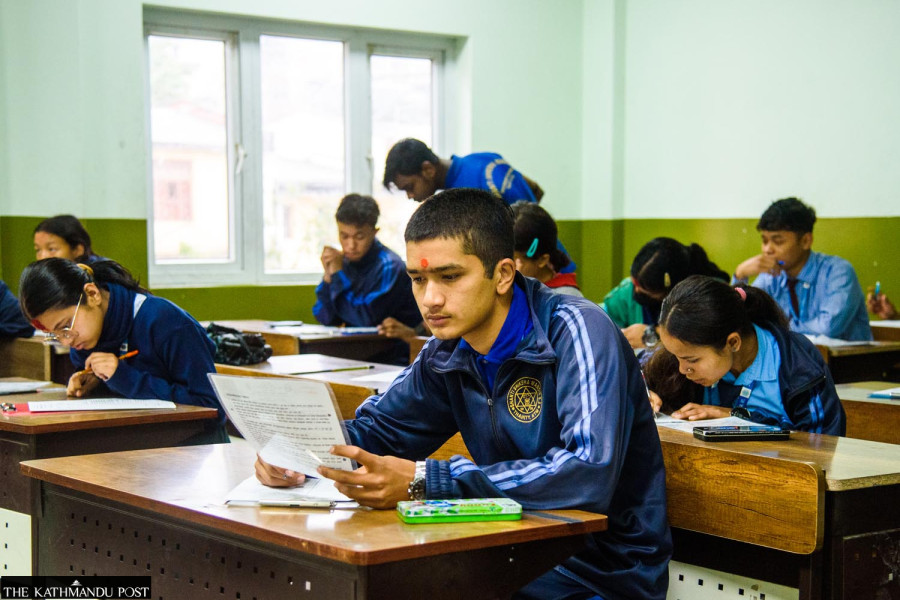National
SEE results show significant student underperformance
High failure rates are reported in Mathematics, English and Science.
Binod Ghimire
Over half of the examinees who sat this year’s Secondary Education Examinations (SEE) are disqualified to study grade 11.
Only 222,472 students—47.87 percent—managed to secure a Grade Point Average (GPA) above 1.60, which is necessary to study at a higher level. Starting this year, the National Examination Board decided to include non-graded tests, meaning the students will have to retake their exams. Among 464,785 students who appeared in the grade 10 final tests, 242,313 students—52.13 percent—have been categorised as non-graded.
As per the results published on Thursday, 115,834 examinees who received a non-grade in up to two subjects will be allowed to take supplementary examinations on August 2 and 3. As many as 67,796 students got non-grade in one subject, and 48,038 in two subjects.
“More students will qualify to study grade 11 once the results of the supplementary tests are out,” said Mahashram Sharma, chairperson of the board.
A total of 504,414 students had registered for the exam, however, over 50,000 of them didn’t sit for the national board. As in previous years, the students performed dismally in Mathematics, Science and English. Close to 40 percent—177,895—of the students failed to secure the pass grades in Mathematics. The number of students obtaining non-grades in Science, English and Social Studies is 126,933, 101,383 and 73,877 respectively. A total of 69,532 examinees failed to obtain the minimum grades in Nepali.
Asked how he evaluates the results, Dipak Kaphle, secretary at the Ministry of Education, Science and Technology, said it has given an opportunity to plan for better policies to improve the learning achievement. “We plan to improve the student’s performance in the future. We might need to improve the evaluation system and improve the teaching-learning environment,” he said.
Most schools across the country lack adequate teachers mostly for Mathematics, English and Science that have the highest failure rates. Different reports by the ministry have pointed out an acute shortage of the subject teachers.
A panel led by Janardan Nepal, then joint secretary at the Ministry of Education, had suggested in 2009 that the government add 50,000 new teacher positions from the pre-primary level to grade 12. The report was left unimplemented, and the government went on to form another panel led by Sharma 10 years later, in 2019.
Sharma’s committee had suggested that 57,056 additional positions of teachers need to be created to ensure a smooth teaching-learning process at schools. But no efforts have been made to recruit the necessary teachers yet. As a result, student performance continues to be pessimistic.
As per the results, only 31,209 graduated with GPA 3.60 and above. The maximum GPA a student can score is 4. And 186 students got the highest grade.
Similarly, 68,256 students secured a GPA between 3.20 and 3.60, while 78,847 students managed to secure a GPA between 2.80 and 3.20.
The number of students graduating with a 2.40 to 2.80 GPA stood at 41,177. As many as 2,950 students qualified for grade 11 with 2.0 to 2.40 GPA. Likewise, six students received GPA 1.6 to 2.
Students who received non-grades in up to two subjects will be allowed to attend the grade increment examinations to be conducted by the board after one month. The board said the students would only retake exams for the subjects in which they received non-grades.
The board said those students who received non-grades in more than two subjects can retake examinations for those subjects only next year. According to the board, such students can participate in the annual examination for the next three years. After that, they have to appear in exams for all subjects.
This year, the exams were conducted based on a new syllabus, and the results have been published under the new grading system.
Under the new system, each SEE student must score at least 35 percent mark in the theoretical exams to qualify for higher studies. Students failing to secure the needed marks in theoretical exams will not be eligible to enrol in class 11 and will receive their results in the non-graded category.
Previously, students received grades if they scored at least 35 marks combined from theoretical and practical exams. From now on, there will be separate grading for theoretical and practical exams.
The new curriculum has introduced a system where each subject, including Mathematics, will have a 25-mark practical exam and a 75-mark theoretical exam. Students have to secure 27 marks under the theoretical exam. The practical exams are conducted by the schools themselves, and the obtained marks are sent to the board.




 10.12°C Kathmandu
10.12°C Kathmandu














